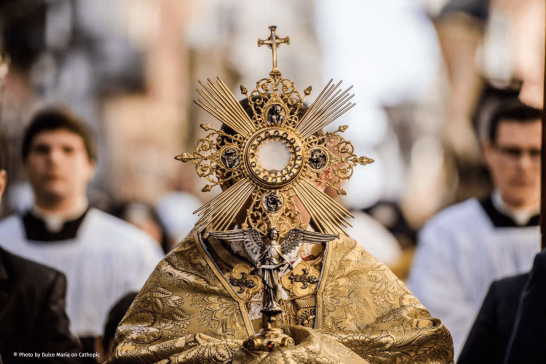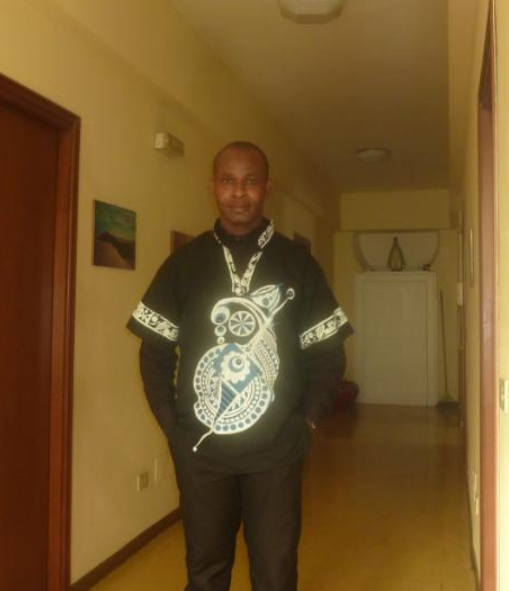Corpus Christi Year C
First Reading: Genesis 14:18-20
Second Reading: 1 Corinthians 11:23-26
Gospel: Luke 9:11-17
The Solemnity of the Most Holy Body and Blood of Christ, historically known by its Latin name, Corpus Christi celebrates the Real Presence of Jesus Christ in the Holy Eucharist—Body, Blood, Soul, and Divinity. During the 12th century, the real presence of Jesus in the Blessed Sacrament was questioned and there were debates about whether Jesus is present in the species of bread and wine in symbol or in reality. In 1263 a German priest, Fr. Peter of Prague, while on pilgrimage to Rome, stopped in Bolsena, Italy to celebrate mass at the Church of Saint Christina. He too had doubts about Jesus being truly present in the Holy Eucharist. While he said the consecration prayer, blood started seeping from the consecrated host and onto the altar and corporal. Fr. Peter reported this miracle to Pope Urban IV, who at the time was nearby in Orvieto. The pope sent delegates to investigate and ordered that host and blood-stained corporal be brought to Orvieto. The relics were then placed in the Cathedral of Orvieto, where they remain to this day.
Before this time, St. Juliana, a nun and mystic had a series of visions in which she was instructed by Our Lord to work to establish a liturgical feast for the Holy Eucharist, to which she had a great devotion. The Church is not usually quick to approve visions. But this miracle became the sign Pope Urban was looking for. He instituted Corpus Christi for the Universal Church and celebrated it for the first time in Orvieto in 1264, a year after the Eucharistic Miracle in Bolsena. He commissioned the Dominican friar, St. Thomas Aquinas, to compose the Mass and Office for the feast of Corpus Christi. Aquinas’ hymns in honour of the Holy Eucharist: Pange Lingua, Tantum Ergo, Panis Angelicus, and O Salutaris
I want to share with you the story of Nellie Organ, a four-year-old girl who came to be called Little Nellie of Holy God. She was born in the family quarters of the Royal Garrison Barracks in Waterford in August 1903, just three weeks after the election of Pope Pius X. Her since father was working in the British army. Nellie’s father, William, with his family, was transferred to the barracks on Spike Island in Cork Harbor. Nellie’s mother died there. William decided that he could not care for the children; there were four children in the family: two girls and two boys. The two girls were given to the care of the Good Shepherd Sisters at St. Finbarr’s Industrial School in Sunday’s Well, Cork and the two boys were sent to another care home. Nellie spent only one year in Sunday’s Well before she died due to illness. She had whooping cough when she arrived and it was also discovered that she had a spinal injury which was later discovered to have been caused when the family’s child-minder dropped her as a baby. She also had tuberculosis and caries, a rotting disease of the gums and jaws.

Nellie is famous for her outstanding love of Jesus in the Eucharist which she called Holy God. One night when Mother Superior was wishing Nellie good night, Nellie asked her if she would bring Holy God up to her in the morning. Mother Francis said she would come to see her after Mass which Nellie understood to meaning that she would bring her Holy Communion. When Mother Francis came without Holy Communion Nellie was devastated. Then Nellie asked people to come to her bedside for a moment after receiving Jesus in Holy Communion and then they could return to the chapel to finish their thanksgiving. That was the closest she could get to receive Jesus in Holy Communion.
At that time, a Jesuit, Fr Bury was giving a retreat in the convent and visited Nellie’s bedside each day. He realized that Nellie, although only four years of age, loved Jesus in the Holy Eucharist and had good knowledge of it. Fr Bury asked her, “What is Holy Communion?” She answered, “It is Holy God.” Fr Bury asked her what would happen when she would be allowed to receive Holy Communion. She answered, “Jesus will rest on my tongue and then He will go down into my heart.” That is a beautiful description of receiving Jesus in Holy Communion. Fr Bury realized that Nellie, although only four years and three months, met the criteria necessary to receive Holy Communion. And at that time children had to wait until the age of twelve to receive Jesus in Holy Communion.
Fr Bury heard her confession and contacted the bishop of Cork for permission to give her Holy Communion. The bishop agreed. She was dressed in white and taken down to the convent chapel for her first Holy Communion. According to the account of Mother Francis, the moment Nellie received Holy Communion, her features shone as if the presence of the great light in her heart reflected itself in her face. A couple of others made the same observation. Her extraordinary radiance at receiving Holy Communion was seen more particularly at her other Communions because, after the first, she was quickly taken out of the chapel. And her thanksgiving after receiving Holy Communion continued until late in the afternoon. From the day of her First Holy Communion, the odor from Nellie’s mouth caused by the rotting of her gums and jaws ceased. Less than two months after receiving her First Holy Communion Nellie died on Sunday, February 2nd 1908, aged 4 years, 5 months and 8 days and was buried in St. Joseph’s Cemetery in Cork.
Eighteen months after her death permission was granted to have Nellie’s remains transferred to the Good Shepherd Convent Cemetery and upon opening her grave her body was found to be incorrupt. Her body was fresh with no sign of the wasting disease she had at her death. She is a beautiful example of the transformation that happens to us when we receive Jesus in Holy Communion. Pope Pius X was considering lowering the age of children to receive Holy Communio from twelve to seven and when he heard the story of Nellie, he said she was the sign he was waiting for. On August 15, 1910, pope Pius X published his encyclical Quam Singulari encouraging frequent and early Holy Communion for children.
The Gospel today is Luke’s account of the miraculous feeding of the 5000 with five loaves and two fish. Luke tells us that it took place in a desert place. In the Gospels, location is always theological. This miracle story happening in the desert place evokes memories of two Old Testament events: God feeding His people with manna in the desert during the Exodus and Elisha feeding 100 men with 20 loaves of barley and fresh ears of grain. In 2 Kings, 4: 42 – 44, a man came from Baal-Shalishah, bringing Elisha bread of the first fruits, 20 loaves of barley and fresh ears of grain. Elisha said to his servant, “give the men that they may eat.” His servant asked, “how am I to set this before a hundred men? Elisha repeated, “give them to the men that they may eat, for thus says the Lord, “They shall eat and have some left.” He set it before them, and they ate and had some left according to the word of the Lord. The first unmistakable message is that we have somebody who is greater than Moses and who is greater than Elisha.
In a special way, the miraculous feeding of the 5000 points to and anticipates the gift of Himself in the Eucharist under the appearance of bread. He took the bread, blessed it, broke it and gave it to the 12 to distribute to the people. Notice the verbs and their order: take, bless, break and give. Where else do we see this exact arrangement of verbs? On the night he was betrayed, He took bread, said the blessing, broke it and gave it to the 12 saying this is my Body which will be given for you. Do this in memory of me.
The target of this solemnity is to strengthen our faith in the real presence of Jesus in the Holy Eucharist and cultivate or renew a strong and ardent devotion to Jesus in the Blessed Sacrament. Just as manner sustained the people of God in the desert on their way to the promised land, the so, Jesus the true bread of Life sustains us, the new people of God on our journey to the new promised land; heaven. Love Jesus in the Blessed Sacrament and participate always in this banquet. St Paul said in the second reading, “For as often as you eat and drink, you proclaim the death of the Lord.
God bless you!

Fr Chidi Onwuka M.Ss.Cc
